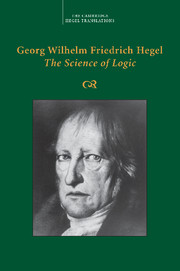Chapter 3 - The Becoming of Essence
Published online by Cambridge University Press: 30 September 2021
Summary
ABSOLUTE INDIFFERENCE
Being is abstract indifference, and when this trait is to be thought by itself as being, the abstract expression “indifferentness” has been used – in which there is not supposed to be as yet any kind of determinateness. Pure quantity is this indifference in the sense of being open to any determinations, provided that these are external to it and that quantity itself does not have any link with them originating in it. The indifference which can be called absolute, however, is one which, through the negation of every determinateness of being, of quality and quantity and of their at first immediate unity, that is, of measure, mediates itself with itself to form a simple unity. Determinateness is in it still only a state, that is, something qualitative and external which has the indifference as a substrate.
But that which has thus been determined as qualitative and external is only a vanishing something; as thus external with respect to being, the qualitative sphere is the opposite of itself and, as such, only the sublating of itself. In this way, determinateness is still only posited in the substrate as an empty differentiation. But it is precisely this empty differentiation which is the indifference itself as result. And this indifference is indeed concrete, in the sense that it is self-mediated through the negation of all the determinations of being. As such a mediation, it contains negation and relation, and what was called “state” is a differentiation which is immanent to it and self-referring. It is precisely this externality and its vanishing which make the unity of being into an indifference: consequently, they are inside this indifference, which thereby ceases to be only a substrate and, within, only abstract.
INDIFFERENCE AS INVERSE RATIO OF ITS FACTORS
We now have to see how this determination of indifference is posited in the indifference itself and the latter is posited, therefore, as existing for itself.
1. The reduction of at first independently accepted measure-relations establishes their one substrate; this substrate is their continuing into one another and is, therefore, the one indivisible independent measure which is wholly present in its differentiation.
- Type
- Chapter
- Information
- Georg Wilhelm Friedrich Hegel: The Science of Logic , pp. 326 - 336Publisher: Cambridge University PressPrint publication year: 2010

